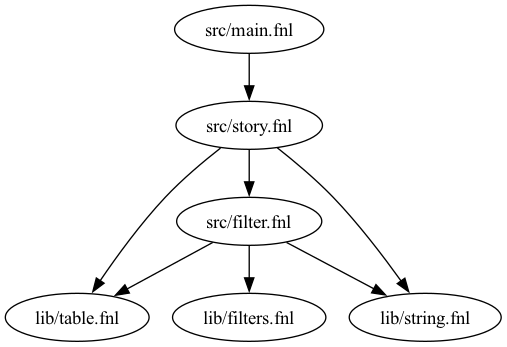tbls
for expanding random table entries
Requirements
- Fennel 1.3.1 on PUC Lua 5.4
- gnu recutils 1.9: for querying metadata
- just 1.34.0: just a task runner
Installing
You can run the script: fennel src/main.fnl.
Or you can compile a binary and use that.
See just compile.
There is also a vim plugin for the tbls format.
See vim-tbls/README.md.
Architecture
src/story.fnl: core of the project. where all the file handling and text parsing happenssrc/main.fnl: wrapper for story.fnl. the ui.src/filter.fnllogic for applying filters to stringslib/*.fnllibraries and helper functions
Tutorial
Random Selections
At its most basic, tbls selects a random element from a table.
Suppose you have a few tables:
:: suit
Hearts
Bells
Whistles
Cups
Knives
Shovels
:: card
Ace
One
Two
[...]
Queen
King
Beast
tbls might return "Whistles" from suit.
Or "Two" from card.
Expansion
But wait there's more.
tbls will also expand certain text found in a table entry.
Let's add another table:
:: draw
[card] of [suit]
When you place the name of a table in [squarebrackets],
then tbls views that as a placeholder
for a random item from that table.
It will expand that text.
So 'draw' might end up being "Thief of Shovels"
or "Twelve or Cups".
Filters
tbls can run arbitary filters on text after expanding it.
Example filters can be found in lib/filters.fnl.
To apply filters, dot-chain them at the end of a table reference.
Consider the following tables:
:: origin
Evelyn eats one [fruit.c]
Evelyn eats many [fruit.c.s]
:: fruit
banana
apple
pear
s, plural, and pluralize
are all different ways
to call the 'plural' filter function.
c is 'capitalize.'
Example output:
Evelyn eats one Pear
Evelyn eats many Bananas
Roadmap
- random table entries (ADDED in vHydrogen)
- expanding macros (ADDED in vHydrogen)
- table files plugin: syntax highlighting + folding (ADDED vHelium)
- expansion filters (ADDED vHelium)
- table context
Resources
inspired heavily by tracery: https://github.com/galaxykate/tracery
and this list-to-html geneator from slight adjustments: https://slightadjustments.blogspot.com/p/generator.html
but also paper elemental's: https://paperelemental.blogspot.com/p/list-to-html-generator.html
and perchance: https://perchance.org/welcome
